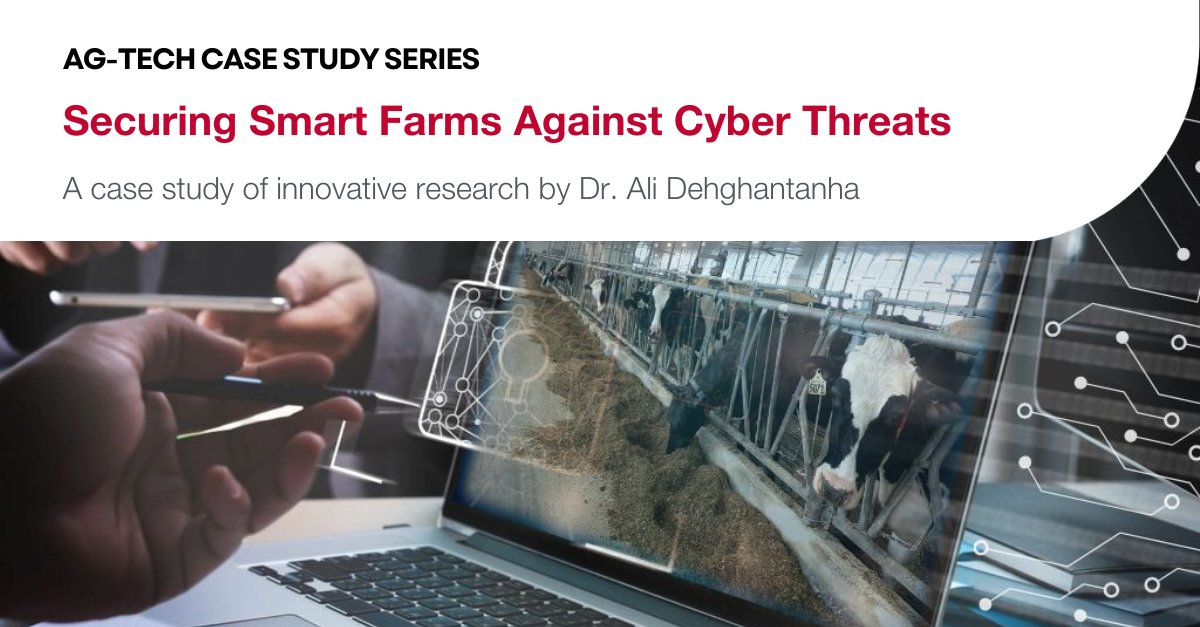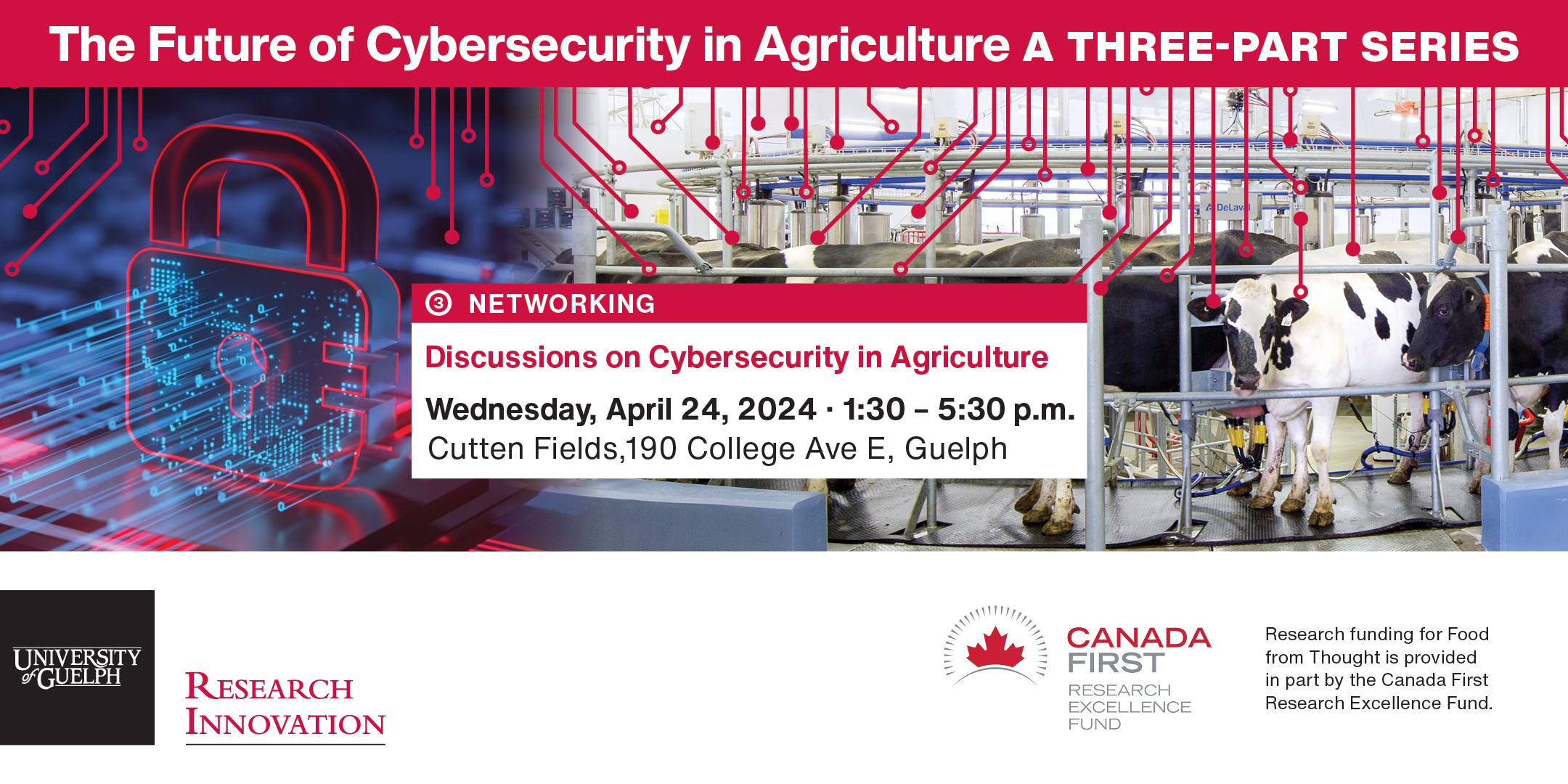At first glance, a dairy or poultry barn might not seem like an obvious choice for a cyberattack. But as farms increasingly rely on new technology, including internet-connected smart systems that control everything from barn temperature to feeding infrastructure and milking robots, malicious actors see them as easy prey.
“Hackers do not care whether you are an individual or a small or big organization,” said Dr. Ali Dehghantanha, an associate professor in the University of Guelph School of Computer Science, a Canada Research Chair, and founding director of the Cyber Science Lab (CSL). “If you’re an easy target, they would come for you.”
Thanks to industry-leading research and data monitoring systems developed by Dehghantanha and students in the CSL, Canadian dairy farmers now have the tools they need to identify and prevent cyber-attacks in real time. “As we work with clients and they improve the level of cybersecurity, the interest of profit-hacking groups diminishes quickly,” Dehghantanha said. “The minute hackers find these [farm systems] are difficult to compromise, they move on to the next available target.”
Dehghantanha worked with two Canadian dairy operations to develop and implement cyber-threat monitoring systems that continuously scan Smart Farm systems to identify and prevent attacks. The result is 24/7 monitoring, augmented with emergency rapid-response IT services from CSL graduate students. This research is funded by Food from Thought and the Ontario Agri-Food Innovation Alliance, a collaboration between the Government of Ontario and the University of Guelph.
“These platforms are stopping all known attacks,” said Dehghantanha. Given that zero threats were able to infiltrate the system within the study period, this system could easily save farmers millions of dollars — or more – if widely adopted. “If you can damage the temperature control of a chicken farm for 10 minutes, all the chicks would die,” said Dehghantanha. “So the time to response in this sector is quite short.”
In addition to financially-motivated ransomware attacks, activist hackers have been known to coerce livestock farmers into recorded confessions and weaponize them in public relations campaigns. But when farmers ask for help from CSL cybersecurity experts, they can avoid damages entirely. “We can recover the information and get them back to the business fairly quickly, without paying the hackers,” Dehghantanha said.
It’s also believed state-sponsored hackers may eventually attack food systems to sow chaos on an enemy’s home front. Although this kind of work has not yet been detected, it’s a high-risk area of concern.
Already, Dehghantanha and his team have identified and demonstrated multiple commercial applications for their work, including plans to launch an agriculture-and-food-specific cybersecurity start-up. They plan to serve both livestock operations and food processing facilities and intend to make their findings available to qualified tech entrepreneurs. “We’re more than happy to collaborate,” said Dehghantanha.
Increasingly, it seems Smart Farming is the way of the future, and old-school analogue systems may soon be remnants of the past. As they adapt, farmers need stringent, quick and effective protection; Guelph researchers are leading the way in the Canadian market.
Quick tips to keep your farm secure from cyberattacks
- Ensure systems are updated and use strong, confidential passwords
- Use automated and remote monitoring systems with encrypted connections, hosted on trusted networks
- Regularly back up vital information to external drives or secure clouds
- Limit access to farm systems, and ensure only essential personnel have access to sensitive data
- Partner with trusted companies and inquire about their cybersecurity protocols before sharing data
- Conduct routine audits with security specialists to assess vulnerabilities, especially after farm changes
- Maintain detailed records of transactions and communications to identify any discrepancies.
If you see something suspicious on your farm
For farmers who see anything out of the ordinary happening on their farms, the Cyber Science Lab offers instant response support to help recover information and negotiate ransomware. Confidentiality is carefully protected, and farmers can reach the lab through the phone number or email listed on the website. Dehghantanha has also received funding to extend the current phase of the security monitoring solution and interested farmers can contact him about implementing the system.
Learn more: The Future of Cybersecurity in Agriculture: Panel and Networking Event
Dive into the dynamic world where technology meets agriculture, and discover how cybersecurity is shaping the future of Canadian agriculture. This event will bring together thought leaders, innovators and industry professionals to discuss cybersecurity capacity and resilience in Canadian Agriculture.
- Keynote Address by Dr. Ali Dehghantanha, Canada Research Chair in Cybersecurity and Threat Intelligence at the University of Guelph.
- Networking Opportunities: Connect with industry leaders and experts paving the way for a secure agricultural landscape.
- Panel Discussion: Unveiling Strategies for Building Resilience in Our Food Systems.
2:00-5:00pm on Wednesday, April 24th, 2024 at Cutten Fields, 190 College Avenue Eat, Guelph, Ontario, N1H 6L3.
Space is limited! Please confirm your attendance at Cutten Fields by registering through the Eventbrite.



